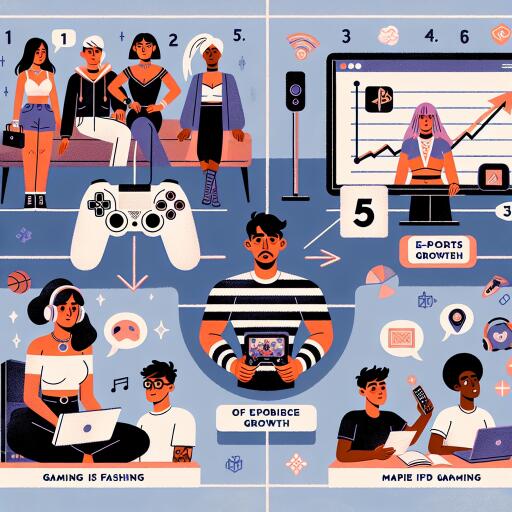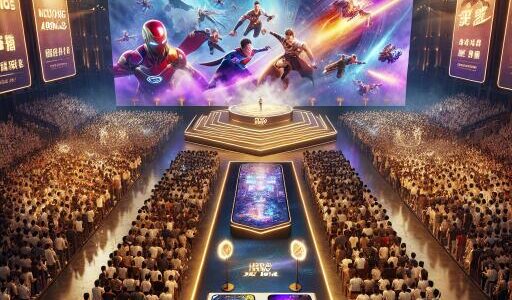Exploring the Impact of Online Gaming on Popular Culture
The landscape of entertainment has been irrevocably changed by the meteoric rise of online gaming, a phenomenon that has grown from a niche pastime into a cornerstone of contemporary culture. With a global community of gamers that numbers in the billions, online gaming has evolved beyond simple recreation to significantly influence various facets of pop culture, including film, music, fashion, and social interaction.
The Transition from Niche Hobby to Cultural Powerhouse
Tracing its roots back to the early days of internet connectivity and simple multiplayer games, online gaming has undergone a transformative journey. The advent of massively multiplayer online role-playing games (MMORPGs) such as “World of Warcraft” in the early 2000s marked a pivotal point, creating vibrant, persistent worlds for players to explore together. This evolution was propelled by rapid advances in technology and the proliferation of high-speed internet, making online gaming more accessible. Titles like “Fortnite” and “Minecraft” have not only attracted vast audiences worldwide but have also become platforms for creative expression, social gatherings, and major virtual events, thus cementing gaming’s role in the mainstream entertainment sphere.
Cross-Pollination with Movies and TV Shows
Cultural intersections between online gaming and traditional media have become increasingly common, with successful game franchises being adapted into films and television series. These adaptations often boast high production values and tap into the deep narrative potential of the games they’re based on, bringing beloved characters and intricate storylines to a broader audience. Moreover, the entertainment industry has embraced the gaming phenomenon through celebrity cameos in games and thematic references within popular TV shows, reflecting the growing synergy between these forms of media.
Fashion Forward: Gaming’s Sartorial Influence
The realms of online gaming and fashion have collided in thrilling ways, producing collaborations that excite both gamers and style enthusiasts alike. High-end designers and streetwear brands have drawn inspiration from the dynamic visuals and rich storylines of online games, while limited edition merchandise and in-game cosmetic items have become coveted symbols of cultural capital among fans. These crossover ventures demonstrate the far-reaching influence of gaming aesthetics, contributing to the blurring of lines between virtual and material fashion landscapes.
Virtual Beats: The Convergence of Gaming and Music
Online gaming has also made an indelible mark on the music industry through virtual concerts and the integration of game soundtracks in mainstream music platforms. Virtual events held in gaming environments offer immersive experiences that are pushing the boundaries of live music, attracting millions of attendees and redefining the concert experience. Additionally, game soundtracks are enjoying commercial success and critical acclaim, with some scores even topping music charts, further testament to the seamless integration of gaming with the music world.
Gaming at the Heart of Social Media and Digital Life
Influencers and content creators dedicated to gaming are among the most recognizable figures on platforms like YouTube and Twitch, where they shape trends and influence the broader cultural discourse. These personalities highlight the profound impact online gaming has on social media trends and the creation of digital communities. Moreover, iconic memes and viral trends often originate within these vibrant gaming communities, influencing the lexicon and humor of digital conversations far beyond the gaming sphere.
Everyday Life, Enhanced by Gaming
Gamification—the application of gaming principles in non-gaming contexts—has found its way into fitness, education, and other everyday activities, making routine tasks more engaging and enjoyable. From augmented reality games encouraging outdoor exploration to educational software that makes learning an adventure, gamification exemplifies gaming’s beneficial impact on daily life. Furthermore, the social features intrinsic to many online games foster community building and teamwork skills, illustrating how gaming platforms can serve as contemporary social squares.
Conclusion
As the influence of online gaming continues to expand, its imprint on popular culture becomes increasingly profound and multifaceted. Engaging with gaming culture, whether by playing games, attending virtual events, or participating in online communities, offers a direct connection to the zeitgeist of the digital age. With its capacity to influence entertainment, fashion, music, and social interactions, online more gaming stands as a testament to the transformative power of digital innovation. The future promises even greater integration of gaming into our cultural fabric, heralding new possibilities for creativity, connectivity, and engagement.








